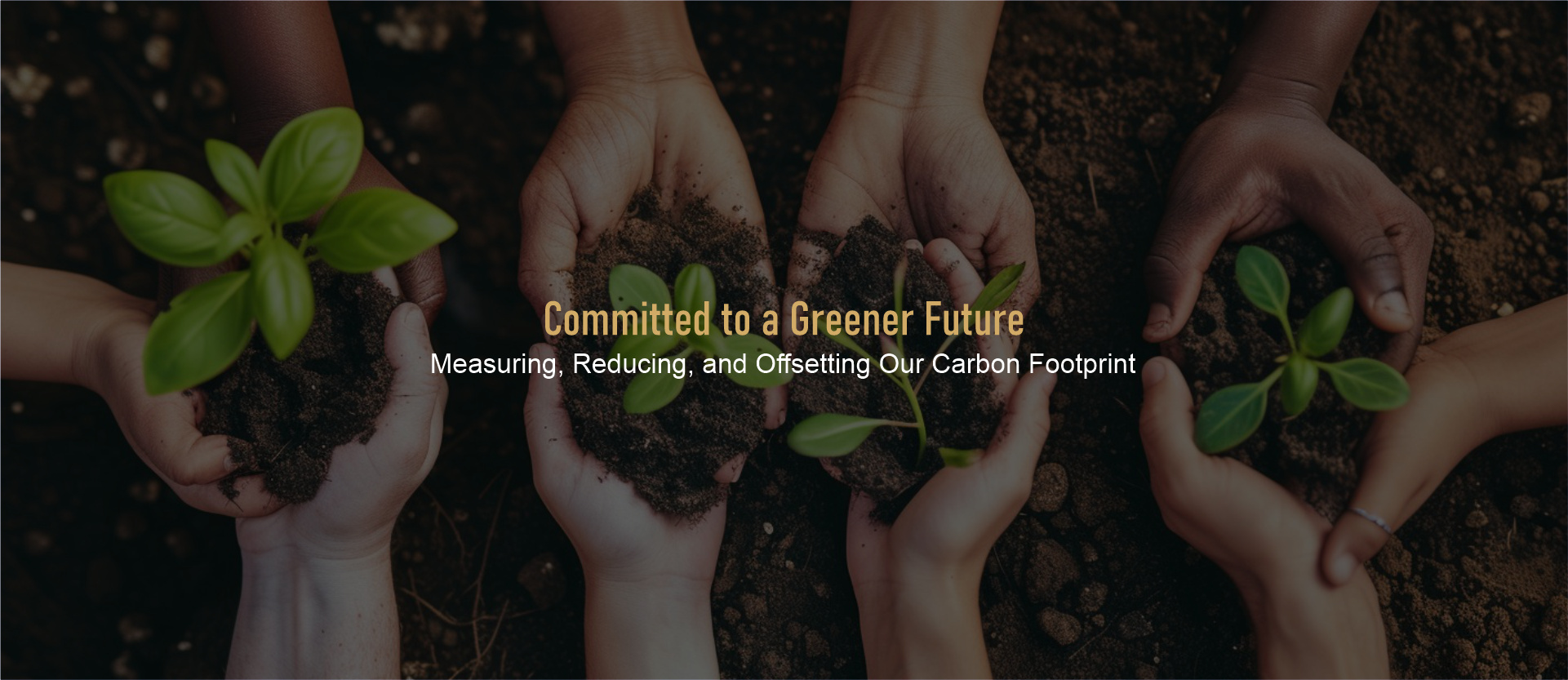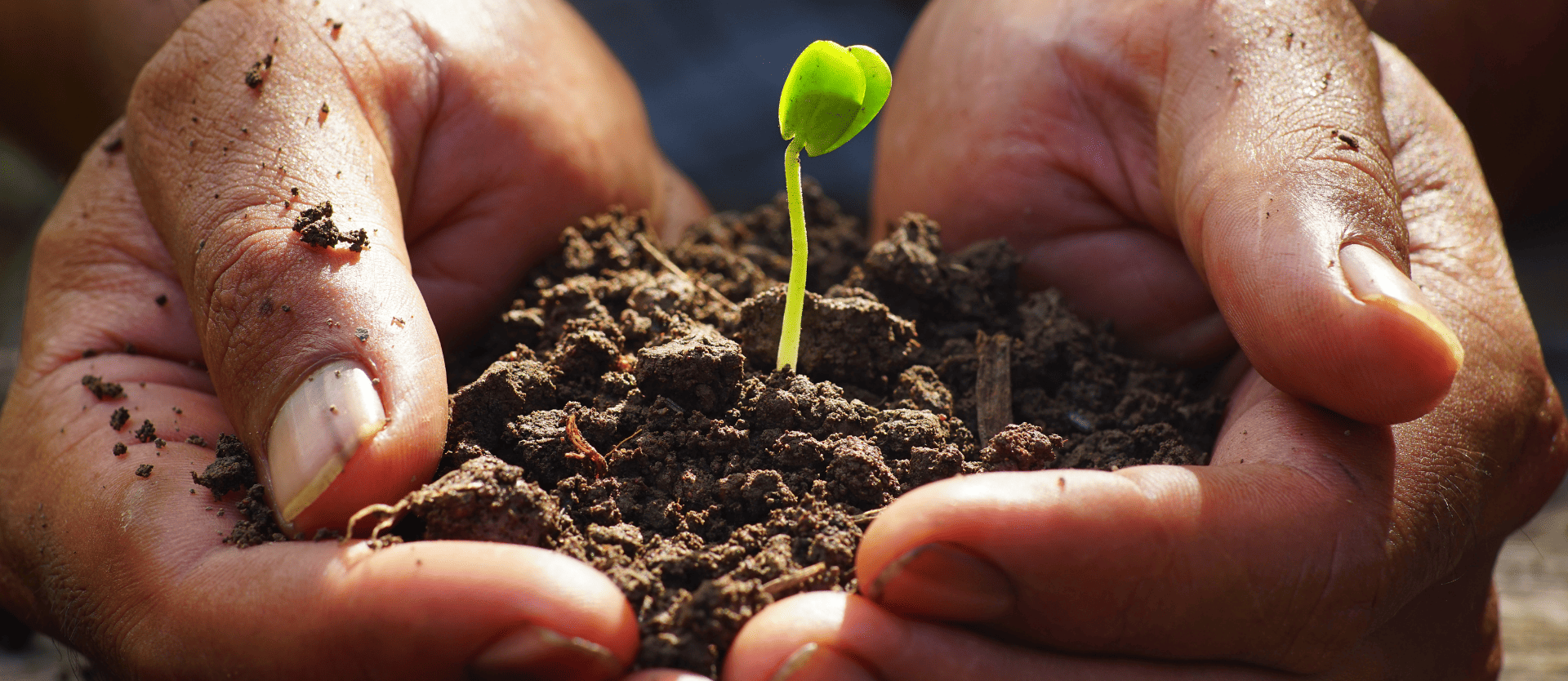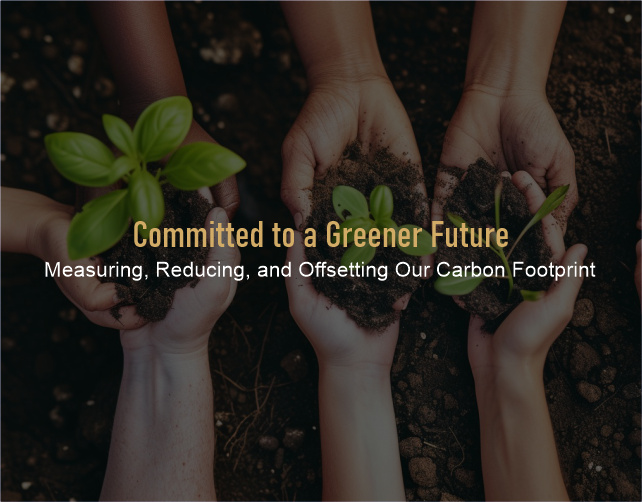
At Jewel Star Group, we are deeply committed to understanding and mitigating the environmental impact of our operations. As part of our ongoing sustainability efforts, we have conducted a Greenhouse Gas (GHG) Inventory & Carbon Offset Report for the period from April 1, 2023, to March 31, 2024. This report follows internationally recognized standards, including PAS 2050 and ISO 14067, to ensure transparency and accuracy in assessing our carbon emissions.
Scope 1
Emissions (Direct): 8.03 tCO₂e (2.98% of total emissions)
Fugitive Emissions:
Refrigerants (3.846 tCO₂e).
Stationary Combustion:
Diesel (2.395 tCO₂e)
Natural Gas (1.79 tCO₂e)
Scope 2
Emissions (Indirect): 261.5 tCO₂e
Total Emissions:
269.6 tCO₂e. (Scope 1 + Scope 2)
Purchased electricity accounts for 97.02% of total emissions, with the remaining 3% coming from natural sources.
The carbon emissions unit for 1 carat of polished Lab-Grown Diamond (LGD) stands at 3.209 kg CO₂e/carat, highlighting our focus on reducing environmental impact per unit of production. The total emissions for the reporting period amounted to 269.6 tCO₂e, with emissions divided into Scope 1 and Scope 2.
Scope 1 (Direct Emissions) accounted for 8.03 tCO₂e (2.98% of total emissions), primarily from fugitive emissions (refrigerants) and stationary combustion sources (diesel and natural gas).
Scope 2 (Indirect Emissions) represented 261.5 tCO₂e, driven largely by purchased electricity, which accounts for 97.02% of our total emissions. The remaining 3% comes from natural sources.
Our comprehensive carbon offset strategy includes reducing emissions through energy efficiency measures, transitioning to cleaner energy, and offsetting our carbon footprint through dedicated sustainability initiatives.

Sustainability is not just a buzzword; it's an integral part of our philosophy and operations. We recognize the significant environmental impact of diamond production and are committed to reducing our carbon footprint at every stage of the manufacturing process. To ensure our diamonds meet the highest sustainability standards, we conduct detailed Product Carbon Footprint (PCF) assessments for every CVD (Chemical Vapor Deposition) diamond we produce. These assessments meticulously track emissions across the entire production lifecycle, from cradle to gate, providing a comprehensive understanding of our environmental impact.
Our approach to sustainability is holistic, focusing not only on the direct emissions generated by our operations but also on minimizing energy consumption, reducing waste, and optimizing resource use. By continuously refining our processes and implementing innovative technologies, we have been able to achieve an exceptionally low carbon footprint of just 3.209 kg CO₂e per carat of polished lab-grown diamond (LGD). This remarkable achievement reflects our unwavering commitment to sustainability and our determination to minimize the environmental impact of every diamond that bears the Jewel Star name.

We take great pride in these efforts, knowing that each step we take towards reducing our carbon footprint contributes to a more sustainable future. From our cutting-edge manufacturing facility in Surat, where we integrate both CVD and HPHT technologies, to our carefully monitored energy consumption and waste management practices, we leave no stone unturned in our quest for sustainability. Our PCF assessments are aligned with PAS 2050 and ISO 14067 standards, ensuring transparency, accuracy, and accountability in every aspect of our carbon reporting.
At Jewel Star Group, our diamonds are not only a symbol of elegance and beauty but also a testament to our commitment to a greener, more sustainable world. By choosing our diamonds, you are not just investing in a high-quality product, but in a brighter future for the planet.

At Jewel Star Group, our commitment to social responsibility goes beyond business success; it’s about leaving a lasting, positive impact on the communities we serve. Our journey towards giving back to society has been driven by the desire to create sustainable solutions to pressing challenges, and one of the most impactful of these initiatives has been addressing the water scarcity faced by rural areas in Gujarat.
Water scarcity is a critical issue that affects millions of lives, especially in the rural regions of India. In many areas, farmers and their families struggle to access a reliable source of water, jeopardizing both their crops and their livelihoods. Recognizing the urgent need for a solution, Jewel Star Group launched a transformative initiative aimed at alleviating water scarcity and empowering local communities. One of our most significant contributions in this regard was funding the construction of a dam on the Kalubhar River in the village of Chogath, located in Gujarat.
The construction of the Kalubhar River Dam was envisioned as a lifeline for the region, offering a sustainable solution to the recurring water shortages faced by rural villages in the area. Before the dam’s construction, villages like Chamaradi and Ratanpur struggled with an unreliable and often inadequate water supply, particularly during critical agricultural seasons. This created significant challenges for the farmers who rely on consistent irrigation to grow their crops and sustain their livelihoods. The lack of water not only threatened agricultural productivity but also exacerbated poverty and left families vulnerable to economic instability.
Understanding the gravity of the situation, Jewel Star Group took immediate action, funding the construction of the dam as part of our broader vision to address water scarcity and improve the quality of life for rural communities. The dam was strategically designed to harness and store the water from the Kalubhar River, ensuring that it would be available year-round for irrigation purposes. With a capacity to serve the needs of the surrounding villages, this infrastructure has become an invaluable resource for the region, providing access to consistent water for both agricultural and domestic use.

The dam’s completion has had a profound impact on the surrounding communities, particularly for the 50,000 farmers in the region who now have access to a reliable water source. Prior to the dam’s construction, these farmers struggled to irrigate their fields, especially during the dry seasons when water levels in local reservoirs and rivers would drop to critical lows. This inconsistency in water supply severely affected crop yields and, in many cases, led to failed harvests, directly impacting the income and wellbeing of farming families.
With the dam now in place, the consistent supply of water has transformed the agricultural landscape. Farmers can now irrigate their fields with ease, leading to improved crop yields and enhanced agricultural productivity. This has not only increased the overall prosperity of the region but has also provided financial stability for families who depend on farming for their livelihoods. In addition to benefiting the local economy, the initiative has also contributed to food security, ensuring that communities are able to sustain themselves and thrive.
While the dam has undoubtedly been a game-changer for agricultural productivity, its impact goes far beyond farming. The consistent water supply has improved living conditions for countless families, who no longer need to endure the hardships caused by water scarcity. It has enabled the development of new opportunities for local businesses, as reliable water access is critical for various industries, from small-scale manufacturing to local markets.
Moreover, the project has helped build a sense of unity within the communities. The construction of the dam involved collaboration between local residents, government authorities, and various stakeholders, fostering a sense of shared purpose and community development. People who were once isolated and disconnected now work together to maintain and manage the dam, ensuring its continued success and sustainability.
In addition to the immediate benefits for agriculture and water access, this initiative has had a long-term positive effect on the social fabric of the region. With more reliable access to water, children can now attend school without having to spend hours each day fetching water from distant sources. Families can invest in their homes and improve their quality of life, which, in turn, leads to greater opportunities for education, employment, and overall community development.

The construction of the Kalubhar River Dam is just one example of Jewel Star Group's ongoing commitment to creating sustainable change in the communities we serve. By focusing on long-term solutions to pressing challenges, we aim to empower people, uplift communities, and create an enduring impact for generations to come. Our vision goes beyond charity—it’s about building a future where communities can thrive independently and sustainably.
Our commitment to water sustainability and community welfare aligns with our broader mission of responsible business practices, environmental stewardship, and ethical corporate governance. As we continue to grow and expand our reach, we remain dedicated to pursuing initiatives that address critical issues like water scarcity, education, healthcare, and economic development, ensuring that our contributions to society are meaningful and impactful.
The Kalubhar River Dam is a testament to the power of collaboration, innovation, and a shared commitment to improving lives. Through this initiative, Jewel Star Group has demonstrated that corporate responsibility extends far beyond business success—it’s about creating lasting change and making a real difference in the lives of the people who need it the most. We are proud of the positive impact this project has had on the communities in Gujarat, and we remain dedicated to continuing our efforts to empower individuals, strengthen communities, and build a sustainable future for all.
By supporting initiatives like this, Jewel Star Group is not only helping to solve immediate challenges but is also fostering a brighter, more prosperous future for the people of Gujarat and beyond. Through continued investment in social welfare and community development, we are creating a legacy of hope, resilience, and lasting change.
As leaders in the field, we recognize the critical importance of ensuring that every diamond we handle—whether mined or lab-grown—meets the highest standards of integrity. This commitment is underscored by our adherence to the Kimberley Process and our dedication to ensuring that our diamonds are sourced responsibly, with the planet and its people in mind.
In 2000, the Kimberley Process Certification Scheme (KPCS) was established as a direct response to the growing need for a solution to the trade of conflict diamonds—stones that fund violence, human rights abuses, and conflict in diamond-producing regions. This collaborative initiative involved the United Nations, governments of diamond-producing nations, industry representatives, and non-governmental organizations (NGOs). Its primary goal was clear: to prevent conflict diamonds from entering the global market and to ensure diamonds are sourced ethically.
By 2003, the Kimberley Process implemented a certification system that requires rough diamonds to be transported in sealed containers, accompanied by certificates issued by government authorities. These certificates validate that the diamonds have been mined and traded in compliance with international ethical standards. Countries that fail to meet these rigorous standards face sanctions, including exclusion from the global diamond trade. As of 2006, nearly 99% of rough diamonds in circulation were certified as conflict-free, a major milestone in the global effort to eliminate the trade of blood diamonds.

At Jewel Star Group, we adhere strictly to the Kimberley Process, ensuring that every mined diamond we source is verified as conflict-free. Our commitment goes beyond simply complying with regulations—we actively engage in a system of full traceability. Every diamond we acquire is meticulously tracked from its origin to its final form, providing complete transparency throughout its journey. We believe in offering our customers peace of mind, knowing that every diamond we sell has been ethically sourced and contributes to a more sustainable and equitable world.
Our dedication to responsible sourcing means we are fully invested in the social and environmental impact of our operations. We ensure that the diamonds we purchase are mined in compliance with both ethical labor practices and environmental standards. By adhering to the Kimberley Process, we guarantee that our diamonds are free from exploitation, human rights violations, and environmental degradation.
At Jewel Star Group, quality and transparency are paramount. We go beyond industry norms by ensuring that every step of the sourcing, certification, and trade process is fully documented. Each diamond is tracked through a comprehensive system that includes both Enterprise Resource Planning (ERP) and Customer Relationship Management (CRM) systems. This allows us to maintain clear visibility and control over the supply chain, ensuring that we can trace every diamond from its point of origin to its final destination.
We also believe in full accountability to our stakeholders—our clients, partners, and customers. Our adherence to the Kimberley Process Certification Scheme and our transparent sourcing practices are a testament to our commitment to integrity and responsible business operations. We understand that the provenance of each diamond is as important as its quality, which is why we take every measure to ensure that the diamonds we offer are ethically sourced and certified.

The importance of sourcing conflict-free diamonds goes far beyond legal compliance—it is a moral imperative. The trade in conflict diamonds has been associated with violence, exploitation, and human suffering in regions where diamonds are mined under dangerous and exploitative conditions. By adhering to the Kimberley Process, we actively contribute to the prevention of such practices, ensuring that every diamond in our inventory is sourced with respect for the people and environments involved in its production.
Ethical sourcing is also critical to the long-term sustainability of the diamond industry. By ensuring responsible mining practices and supporting the local communities where diamonds are produced, we help create a more sustainable future for the industry. Our commitment to sustainable practices means that we prioritize environmental conservation, promote fair labor practices, and engage in efforts to improve the livelihoods of people in diamond-producing regions.
While the Kimberley Process has made significant strides in ensuring conflict-free diamonds, Jewel Star Group believes that sustainability and responsibility in the diamond trade extend beyond certification. We are constantly exploring new ways to enhance our practices, improve traceability, and minimize our environmental footprint. Through innovative solutions, sustainable mining practices, and responsible community engagement, we are working toward a future where every diamond in the global market contributes positively to the world.
As we look ahead, Jewel Star Group is committed to continuously improving our sourcing practices and advancing the standards of responsibility within the diamond industry. We are proud of our legacy of integrity, and we remain dedicated to upholding the highest ethical standards in everything we do—from sourcing and production to customer relations and corporate social responsibility.
We believe that luxury and responsibility can coexist, and we are paving the way for a more transparent, sustainable, and ethical diamond industry. By adhering to the Kimberley Process, supporting fair labor practices, and protecting the environment, we are ensuring that the diamonds we sell will continue to sparkle for generations to come—without leaving a negative impact on the world.

Sustainability is at the heart of everything we do. As part of our commitment to environmental stewardship, we have launched the Plantation for Sustainability initiative, aimed at combating climate change, restoring ecosystems, and fostering biodiversity through large-scale tree planting efforts.
Trees play a crucial role in combating climate change by absorbing carbon dioxide, releasing oxygen, and supporting biodiversity. Our plantation program focuses on reforesting degraded lands and restoring vital ecosystems, contributing to carbon sequestration, soil stability, and improved air quality.

We partner with local communities, NGOs, and government bodies to ensure the success and sustainability of our plantation efforts. Native tree species are carefully selected to support local ecosystems, and ongoing maintenance ensures these trees grow to maturity, providing lasting environmental benefits.
Our sustainability efforts extend beyond plantation. We integrate responsible resource management, waste reduction, and energy-efficient practices throughout our operations. The Plantation for Sustainability initiative is just one part of our broader commitment to reducing our ecological footprint and preserving the planet for future generations.

As our tree planting efforts grow, we are already seeing improved air quality, enhanced soil health, and stronger ecosystems. Local communities benefit from increased access to natural resources and new green jobs, helping to foster economic development.
At Jewel Star Group, we are creating a legacy of environmental responsibility. Every tree planted contributes to a greener, healthier planet, and every action we take is part of our mission to fight climate change and protect natural resources. We believe in a sustainable future, and together, we can make it happen.

© Jewel Star Group. All Rights Reserved
